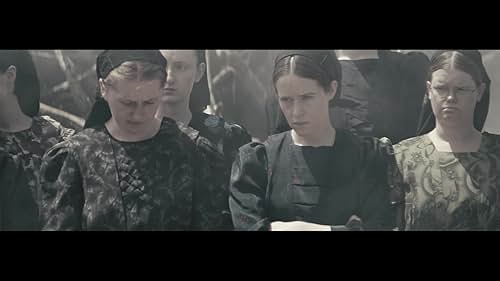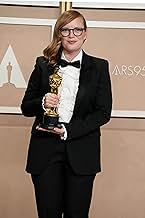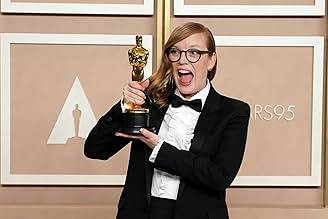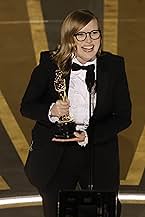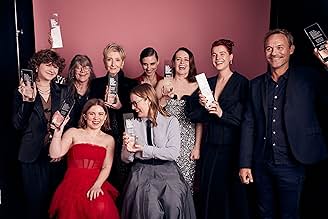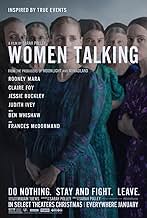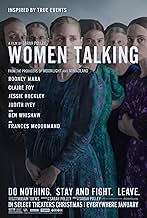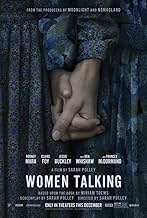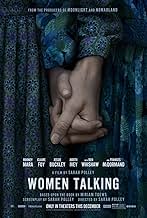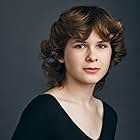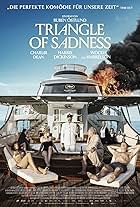Eine Gruppe von Frauen in einer isolierten religiösen Mennonitenkolonie in Bolivien, die darum kämpfen, ihren Glauben mit einer Reihe von sexuellen Übergriffen seitens der Männer der Koloni... Alles lesenEine Gruppe von Frauen in einer isolierten religiösen Mennonitenkolonie in Bolivien, die darum kämpfen, ihren Glauben mit einer Reihe von sexuellen Übergriffen seitens der Männer der Kolonie in Einklang zu bringen.Eine Gruppe von Frauen in einer isolierten religiösen Mennonitenkolonie in Bolivien, die darum kämpfen, ihren Glauben mit einer Reihe von sexuellen Übergriffen seitens der Männer der Kolonie in Einklang zu bringen.
- 1 Oscar gewonnen
- 65 Gewinne & 166 Nominierungen insgesamt
Empfohlene Bewertungen
The fact that the movie is set in 2010 and is based on a true story is not easy to believe. The way things unfold, one would think it is at least in the 50s at the latest for the most part. But the way some cults work, and how people fall for them and spend generations in them is a sad truth of our world. Even though it can be technically called a chamber piece, it doesn't feel like one. There's so much in writing and directing that adds novelty to the story which is not exactly something groundbreaking. There are little moments throughout the film that makes the situation more weird and real at the same time that most films don't do.
You go to bed then wake up bruised, bloody, quite groggy and confused; you know instantly, that your body's been abused, your mind cannot conceive, all the torment and the grief, but you're not the only one, that's being used. So the women of the colony convene, to discuss the implications of what's been, carry on like there's no wrong, stay and fight which might prolong, or leave this place, put barriers between. The conversations, confrontations ebb and flow, the picture of what's taken place is shown, anguish, misery and despair, amongst a culture built on prayer, where the men have their own rules, their manifesto.
It's a wonderful piece of filmmaking that engages from the outset with great dialogue, a disturbing story, and an empowering conclusion - with outstanding performances throughout.
It's a wonderful piece of filmmaking that engages from the outset with great dialogue, a disturbing story, and an empowering conclusion - with outstanding performances throughout.
A group of women from a small religious community discuss various violent acts, beatings and rape.
It is a heavy going watch, a film that manages to intrigue, sicken and inform. Some of the content, some of what you'll hear will genuinely lower your opinion on human nature, the harrowing acts some people can commit.
The best element for me, the acting, if I had to pick out a standout, I'd argue Claire Foy did a supreme job, but the likes of Ben Wishaw and Frances McDormand were excellent also.
I feel like it plays out like a stage play, I can only imagine how powerful some of the content would play out in a small, intimate theatre, one or two bits maybe get a little lost in translation onto the big screen.
I've read some very impressive reviews about this film, some people have spoken candidly about first hand experience of violence, that has clearly given them a different perspective on the film.
At times I felt a little bit like an outsider looking in, and sometimes I couldn't relate, or get into it, some of the sequences felt just a tad slow, some threads were explored but not tied up, I suppose that's just normal in such circumstances.
It's definitely a powerful time, and one that's very, very relevant in today's day and age, a time where women's rights seem to be being downplayed somewhat.
I would recommend it.
7/10.
It is a heavy going watch, a film that manages to intrigue, sicken and inform. Some of the content, some of what you'll hear will genuinely lower your opinion on human nature, the harrowing acts some people can commit.
The best element for me, the acting, if I had to pick out a standout, I'd argue Claire Foy did a supreme job, but the likes of Ben Wishaw and Frances McDormand were excellent also.
I feel like it plays out like a stage play, I can only imagine how powerful some of the content would play out in a small, intimate theatre, one or two bits maybe get a little lost in translation onto the big screen.
I've read some very impressive reviews about this film, some people have spoken candidly about first hand experience of violence, that has clearly given them a different perspective on the film.
At times I felt a little bit like an outsider looking in, and sometimes I couldn't relate, or get into it, some of the sequences felt just a tad slow, some threads were explored but not tied up, I suppose that's just normal in such circumstances.
It's definitely a powerful time, and one that's very, very relevant in today's day and age, a time where women's rights seem to be being downplayed somewhat.
I would recommend it.
7/10.
In 2010, the women of a Mennonite community must come together to make a decision following the discovery of a terrible secret of the men in their community. There are three options: do nothing, stay and fight, or leave. Great. The incipit is undoubtedly as interesting as it is a thriving ground for opening an important dialogue on concepts such as faith, misogyny, and feminism.
While it is an important film, and an important issue, I found the script to be profoundly insincere and artificial, in dialogue that is more like a skein of feminist slogans piled one after another. The way the characters express themselves, interact, and behave is mechanical and relegated to the stereotype of women they represent. To the most controversial character, McDormand's, I was sorry that, even in her being at fault, no space was left.
On a technical level there is nothing particularly significant; the coloring is interesting, if not particularly aesthetic. The performances of course were good, as the cast is mostly made up of great actresses.
Women Talking is commendable in its intended message, but otherwise it seems a wasted opportunity of cast as much as of reference material.
While it is an important film, and an important issue, I found the script to be profoundly insincere and artificial, in dialogue that is more like a skein of feminist slogans piled one after another. The way the characters express themselves, interact, and behave is mechanical and relegated to the stereotype of women they represent. To the most controversial character, McDormand's, I was sorry that, even in her being at fault, no space was left.
On a technical level there is nothing particularly significant; the coloring is interesting, if not particularly aesthetic. The performances of course were good, as the cast is mostly made up of great actresses.
Women Talking is commendable in its intended message, but otherwise it seems a wasted opportunity of cast as much as of reference material.
Powered by strong performances across the board, Women Talking follows the women of an isolated & ultraconservative community who take it upon themselves to decide the course of their future in the wake of a shattering revelation which compels them to reconcile their faith with their violent reality. Bracingly crafted & effectively told, it serves as a plea, a protest & a parable all at once.
Written & directed by Sarah Polley, the story borrows its premise from a real-life event and the film is an imagined response to it - a reaction through fiction. The disturbing truth surfaces in gut-punching ways as the women argue & discuss their next move while snippets of their past adds more weight to their collective pain, rage, fear & trauma. It does get repetitive but it also gets the point across with clarity.
The colour grading is an interesting choice, for it illustrates the bleakness of their existence in a colony ripe with unchecked male aggression but more could've been achieved with the camera. Still, what it lacks in cinematic qualities, it makes up in dramatic heft & strong emotional wallop, thanks to impressive work from the entire cast, ranging from Claire Foy's fierce rendition to Ben Whishaw's tender act, all enriching the narrative.
Overall, Women Talking is a timely, topical & thought-provoking drama that brims with hate, hurt & heartbreak in its illustration of the horrifying reality of female experience but there is also hope for a better future despite the agonising brutality of their past & present. Though there was more up for grabs which it fumbles with its very own creative choices, the commitment from the cast & searing intensity of their inputs makes it an essential viewing.
Written & directed by Sarah Polley, the story borrows its premise from a real-life event and the film is an imagined response to it - a reaction through fiction. The disturbing truth surfaces in gut-punching ways as the women argue & discuss their next move while snippets of their past adds more weight to their collective pain, rage, fear & trauma. It does get repetitive but it also gets the point across with clarity.
The colour grading is an interesting choice, for it illustrates the bleakness of their existence in a colony ripe with unchecked male aggression but more could've been achieved with the camera. Still, what it lacks in cinematic qualities, it makes up in dramatic heft & strong emotional wallop, thanks to impressive work from the entire cast, ranging from Claire Foy's fierce rendition to Ben Whishaw's tender act, all enriching the narrative.
Overall, Women Talking is a timely, topical & thought-provoking drama that brims with hate, hurt & heartbreak in its illustration of the horrifying reality of female experience but there is also hope for a better future despite the agonising brutality of their past & present. Though there was more up for grabs which it fumbles with its very own creative choices, the commitment from the cast & searing intensity of their inputs makes it an essential viewing.
WUSSTEST DU SCHON:
- WissenswertesExplaining the color grading of the film, director Sarah Polley said the filmmakers played with saturation levels to create a feeling of "a world that had faded in the past." This is why the film appears to be almost black and white, but not quite.
- PatzerNettie identifies as a man name "Melvin". The Mennonite do not allow members to identify as anything other than their biological sex and gender. In real life, Nettie would have been excommunicated. There are over one hundred different Anabaptist (Amish, Brethren, Hutterite, Mennonite) church groups, counting more than 6,000 congregations, all holding to slightly different traditions and their own interpretations of the Bible. The movie never identified the Anabaptist group of the colony.
- SoundtracksDaydream Believer
Written by John Stewart
Performed by The Monkees
Courtesy of Rhino Entertainment Company
By arrangement with Warner Music Group Film & TV Licensing
Top-Auswahl
Melde dich zum Bewerten an und greife auf die Watchlist für personalisierte Empfehlungen zu.
Details
- Erscheinungsdatum
- Herkunftsland
- Offizieller Standort
- Sprache
- Auch bekannt als
- Ellas hablan
- Drehorte
- Enercare Centre, 100 Princes' Boulevard, Toronto, Ontario, Kanada(Barn interior scenes)
- Produktionsfirmen
- Weitere beteiligte Unternehmen bei IMDbPro anzeigen
Box Office
- Bruttoertrag in den USA und Kanada
- 5.456.531 $
- Eröffnungswochenende in den USA und in Kanada
- 40.530 $
- 25. Dez. 2022
- Weltweiter Bruttoertrag
- 9.276.103 $
- Laufzeit1 Stunde 44 Minuten
- Farbe
- Seitenverhältnis
- 2.76 : 1
Zu dieser Seite beitragen
Bearbeitung vorschlagen oder fehlenden Inhalt hinzufügen







